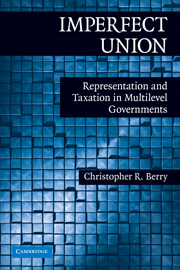Crossref Citations
This Book has been
cited by the following publications. This list is generated based on data provided by Crossref.
Berry, Christopher R.
and
Gersen, Jacob E.
2009.
Fiscal Consequences of Electoral Institutions.
The Journal of Law and Economics,
Vol. 52,
Issue. 3,
p.
469.
Anzia, Sarah F.
2010.
Election Timing and the Electoral Influence of Interest Groups.
SSRN Electronic Journal,
Trounstine, Jessica
2010.
Representation and Accountability in Cities.
Annual Review of Political Science,
Vol. 13,
Issue. 1,
p.
407.
Anzia, Sarah F.
2011.
Election Timing and the Electoral Influence of Interest Groups.
The Journal of Politics,
Vol. 73,
Issue. 2,
p.
412.
Goodman, Christopher B.
2011.
The Fiscal Impacts of Residential Land Use Characteristics.
SSRN Electronic Journal,
Rugh, Jacob S.
and
Trounstine, Jessica
2011.
The Provision of Local Public Goods in Diverse Communities: Analyzing Municipal Bond Elections.
The Journal of Politics,
Vol. 73,
Issue. 4,
p.
1038.
Goodman, Christopher B.
2012.
Local Government Fragmentation & the Local Public Sector: A Panel Data Analysis.
SSRN Electronic Journal,
Martell, Christine R.
and
Greenwade, Adam
2012.
The Oxford Handbook of State and Local Government Finance.
p.
176.
Harada, Masataka
2012.
The Voting Rights Act of 1965 and Strategic Policy Making in the South.
State Politics & Policy Quarterly,
Vol. 12,
Issue. 4,
p.
456.
Beath, Andrew
Christia, Fotini
and
Enikolopov, Ruben
2013.
Democratization, Division of Responsibilities and Governance Quality: Experimental Evidence on Local Institutions in Afghanistan.
SSRN Electronic Journal,
Revelli, Federico
2013.
Tax Limits and Local Democracy.
SSRN Electronic Journal,
Goodman, Christopher B.
2013.
Local Government Fragmentation & the Local Public Sector: A Public Employment Approach.
SSRN Electronic Journal,
GREER, SCOTT L.
WILSON, IAIN
STEWART, ELLEN
and
DONNELLY, PETER D.
2014.
‘DEMOCRATIZING’ PUBLIC SERVICES? REPRESENTATION AND ELECTIONS IN THE SCOTTISH NHS.
Public Administration,
Vol. 92,
Issue. 4,
p.
1090.
Einstein, Katherine Levine
and
Kogan, Vladimir
2014.
Pushing the City Limits: Policy Responsiveness in Municipal Government.
SSRN Electronic Journal,
Flavin, Patrick
and
Hartney, Michael T.
2015.
When Government Subsidizes Its Own: Collective Bargaining Laws as Agents of Political Mobilization.
American Journal of Political Science,
Vol. 59,
Issue. 4,
p.
896.
Lyons, Joseph
2015.
Local Government Structure and the Co-ordination of Economic Development Policy.
Canadian Journal of Political Science,
Vol. 48,
Issue. 1,
p.
173.
Lyons, Joseph
2015.
Conservation authority board composition and watershed management in Ontario.
Canadian Public Administration,
Vol. 58,
Issue. 2,
p.
315.
Goodman, Christopher B.
2015.
Local Government Fragmentation and the Local Public Sector.
Public Finance Review,
Vol. 43,
Issue. 1,
p.
82.
Leon-Moreta, Agustin
2015.
Tax and Expenditure Limitations and Special District Formation.
SSRN Electronic Journal ,
Kogan, Vladimir
2015.
Emerging Trends in the Social and Behavioral Sciences.
p.
1.



